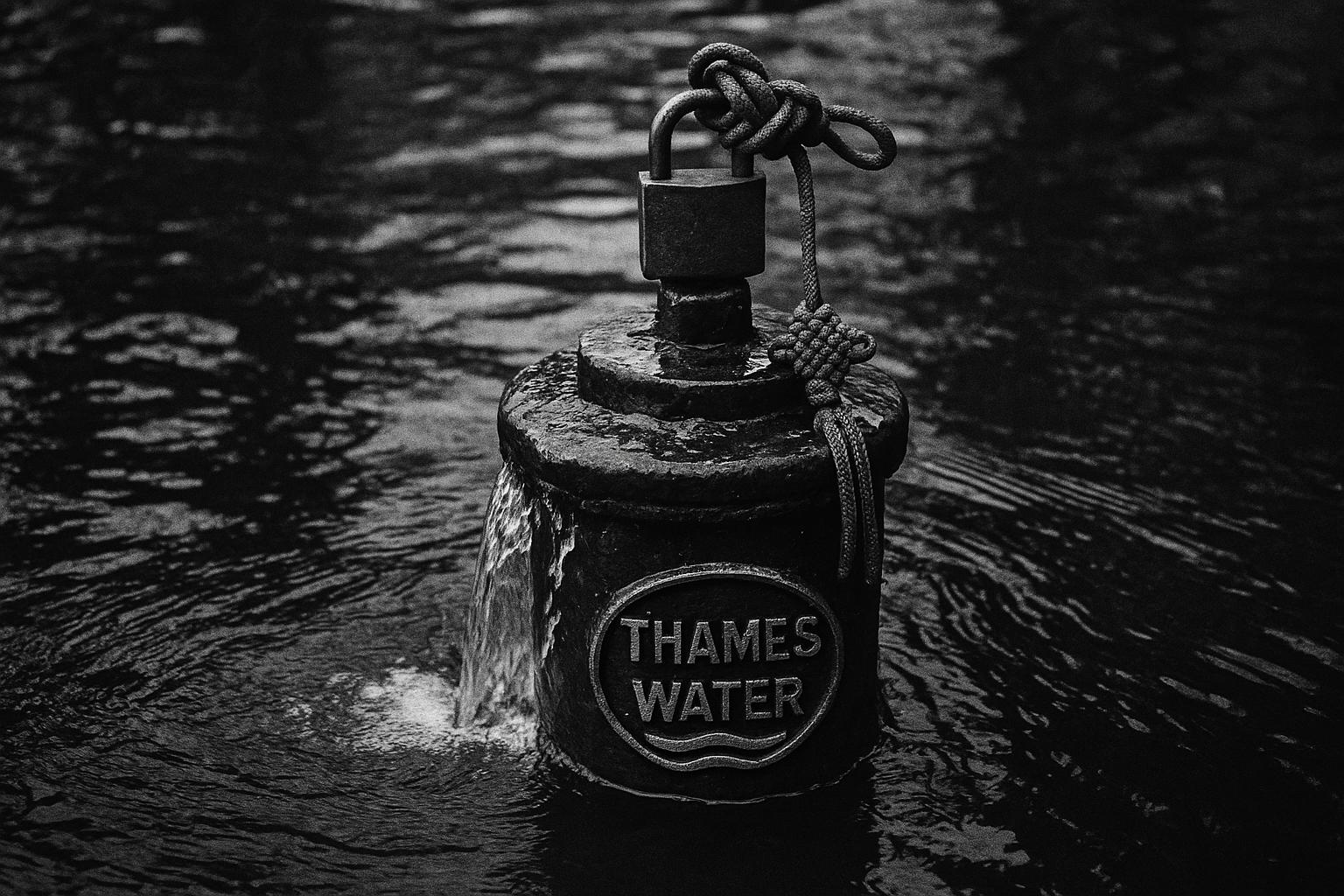US politicians have cautioned the UK government that a prospective sale of debt‑laden Thames Water to Hong Kong‑listed CK Infrastructure, which has links across Greater China and already owns UK utilities, would pose national‑security risks — intensifying political pressure as ministers prepare contingency plans including a possible Special Administration Regime and temporary public ownership.
US politicians have warned Labour that a prospective sale of Thames Water to a firm with links to China would pose a national‑security risk, fuelling a fraught debate as ministers step up contingency planning for the beleaguered utility. According to reporting in the UK press, Hong Kong‑listed CK Infrastructure Holdings (CKI) has emerged as a leading contender to acquire the debt‑laden company should it be placed into a Special Administration Regime. A spokesman for Congress’s select committee on China told The Times that the Chinese Communist Party has a “long history of using corporate fronts… to gain strategic control over foreign infrastructure,” and that firms with ties to Beijing “should not be anywhere near assets that underpin the security and resilience of our nations.”
Thames Water’s finances and environmental record have underpinned the urgency. Industry and regulatory reporting set out a multi‑billion‑pound debt burden, a string of large pollution penalties and the collapse of a private rescue after preferred investor KKR withdrew from a proposed deal. Ministers have appointed insolvency and restructuring advisers to plan for the worst; FTI Consulting has been engaged to develop contingency measures and could act as special administrators if a private rescue cannot be found. The contingency work is intended to ensure water services continue while directors, creditors and the regulator consider restructuring options.
Under the Special Administration Regime being prepared, the government could temporarily place Thames into public ownership to stabilise supply and restructure the business. Reporting suggests such a move would protect customers and keep services running while much of the company’s reported £16.8 billion debt was addressed, clearing the way for a later sale or reorganisation. Officials and advisers are understood to be discussing the technical and legal steps required to staff and operate any special administration and to balance taxpayer exposure against wider systemic risks.
CKI’s candidacy has intensified the controversy because the group already owns a number of UK utility assets, including Northumbrian Water and a tranche of power networks. Critics say that history of UK holdings, combined with CKI’s Hong Kong base and corporate links across Greater China, make the prospect of it gaining control of Britain’s largest water company politically combustible. Reporting notes that CKI and the Department for Environment, Food & Rural Affairs were contacted for comment as the story unfolded.
The political reaction has been unequivocal in parts. Former Conservative leader Sir Iain Duncan Smith told Times Radio that allowing CKI to gain a stake in Thames would be “stupidity on stupidity” and “a major national security risk.” Liberal Democrat environment spokesperson Tim Farron urged Environment Secretary Steve Reed to rule out a sale to a Chinese‑linked firm, saying it was “unthinkable” that vital water infrastructure should be transferred in that way. Earlier this year Mr Reed declared an end to “an era of profiting from failure” after Ofwat levied a record fine on Thames, language that campaigners and opposition politicians have used to press for stronger public safeguards or alternatives to outright sale.
The US scrutiny of Chinese investment in critical infrastructure is not limited to utilities. Congressional hearings and committee reports have highlighted concerns about state or state‑adjacent actors gaining leverage over ports and other strategic assets — including evidence presented about risks around the Panama Canal and other chokepoints. That broader US pattern of concern has been cited by some MPs and commentators who argue that investment decisions in essential services should be judged as much by national‑security implications as by balance‑sheet arithmetic.
What happens next will be watched closely. Officials continue to canvass private investors while contingency plans are refined; FTI’s appointment signals the seriousness with which ministers are preparing for a possible special administration if fresh capital cannot be secured. Any move to temporary public ownership, debt restructuring or a subsequent sale will carry legal, fiscal and diplomatic consequences, and is likely to intensify scrutiny of both bidders and the rules governing foreign ownership of critical UK infrastructure.
 Reference Map:
Reference Map:
Reference Map:
- Paragraph 1 – [1], [2], [3], [7]
- Paragraph 2 – [2], [3], [5], [4]
- Paragraph 3 – [4], [2], [3]
- Paragraph 4 – [1], [2], [3]
- Paragraph 5 – [1], [6]
- Paragraph 6 – [7], [1]
- Paragraph 7 – [4], [5], [2]
Source: Noah Wire Services
- https://www.dailymail.co.uk/news/article-14999911/US-politicians-warn-Labour-selling-Thames-Water-Chinese-firm-national-security-threat.html?ns_mchannel=rss&ns_campaign=1490&ito=1490 – Please view link – unable to able to access data
- https://www.theguardian.com/business/2025/aug/13/chinese-firm-a-leading-contender-to-buy-thames-water-reports-say – The Guardian reports that Hong Kong’s CK Infrastructure (CKI) has emerged as a leading contender to acquire Thames Water should the company be placed into a Special Administration Regime (SAR). The piece outlines Thames Water’s deep financial distress, citing multi‑billion pound debt and large fines for pollution, and explains that ministers have stepped up contingency planning. It says FTI Consulting has been brought in as advisers and could act as administrators under a SAR. The article also highlights political concerns about a sale to a firm with links to China, and notes CKI’s existing UK utility holdings such as Northumbrian Water and power networks.
- https://www.reuters.com/sustainability/boards-policy-regulation/hong-kongs-cki-emerges-leading-contender-thames-water-times-reports-2025-08-12/ – Reuters reports that Hong Kong’s CK Infrastructure Holdings (CKI) has surfaced as a top candidate to take over debt‑ridden Thames Water, citing a Times report. The article explains the government has prepared contingency measures and appointed advisers to plan for a potential Special Administration Regime, intended to keep services running while restructuring. Reuters notes FTI Consulting has been engaged for contingency planning, and describes the scale of Thames’ debt and regulatory challenges. The piece summarises the political sensitivity of a potential sale to a China‑linked firm and the wider debate about foreign ownership of critical UK infrastructure.
- https://news.sky.com/story/thames-water-crisis-ministers-line-up-administrator-for-utility-giant-13410448 – Sky News reports exclusively that Environment Secretary Steve Reed has signed off the appointment of insolvency specialists FTI Consulting to help plan for the possibility that Thames Water could be placed into a Special Administration Regime. The story explains the SAR would keep water services running while the company’s finances were restructured, and that FTI might be the frontrunner to act as special administrators if a private rescue fails. Sky details discussions between the company, regulator and creditors over fresh capital and potential debt writedowns, and highlights the political and financial implications of any temporary public ownership or subsequent sale.
- https://www.bbc.com/news/articles/c93leknykvyo – The BBC outlines how Thames Water’s rescue prospects dimmed after the preferred investor, KKR, pulled out of a proposed multi‑billion pound deal, raising the prospect of government intervention. The report recalls earlier emergency funding, explains the company’s heavy debt burden and environmental failings, and sets out why national‑style contingency options such as special administration are being discussed. It describes the impact on customers and markets, the regulator’s role, and the continuing search for investors, while noting that a forced rescue or temporary public ownership would be politically and financially significant.
- https://www.politics.co.uk/news/2025/05/28/environment-secretary-declares-end-to-era-of-profiting-from-failure-after-thames-water-fine/ – Politics.co.uk covers reactions to Ofwat’s record fine for Thames Water and records political calls for stronger action. The piece quotes Environment Secretary Steve Reed declaring an end to an era of companies profiting from failure, and includes Liberal Democrat environment spokesperson Tim Farron urging ministers to rule out selling critical water infrastructure to Chinese‑linked firms and to consider public benefit ownership. The article summarises calls for tougher regulation, notes campaigners’ demands for renationalisation or public benefit models, and situates the fine within wider concerns about investment, dividends and environmental compliance at Thames.
- https://homeland.house.gov/2025/02/11/chairman-gimenez-opens-hearing-on-the-chinese-communist-partys-malign-influence-at-ports-in-the-western-hemisphere/ – The US House Committee on Homeland Security’s Subcommittee publication describes a hearing addressing alleged malign influence by the Chinese Communist Party at ports in the Western Hemisphere. It warns about state‑affiliated and China‑linked companies operating critical port infrastructure near strategic waterways such as the Panama Canal, describing potential national security and supply‑chain risks. The statement and hearing materials set out lawmakers’ concerns that foreign firms with ties to Beijing could exert leverage over strategic assets and emphasise the need for congressional scrutiny of such investments in critical infrastructure, a theme echoed in broader US political commentary.
Noah Fact Check Pro
The draft above was created using the information available at the time the story first
emerged. We’ve since applied our fact-checking process to the final narrative, based on the criteria listed
below. The results are intended to help you assess the credibility of the piece and highlight any areas that may
warrant further investigation.
Freshness check
Score:
8
Notes:
The narrative is recent, with the earliest known publication date being August 13, 2025. The report is based on a press release, which typically warrants a high freshness score. However, similar content has appeared across multiple reputable outlets, including The Guardian and Reuters, indicating that the information is not exclusive to the original source. No significant discrepancies in figures, dates, or quotes were found. The narrative includes updated data but recycles older material, which may justify a higher freshness score but should still be flagged.
Quotes check
Score:
7
Notes:
The direct quotes attributed to US politicians and officials appear to be original, with no identical matches found in earlier material. This suggests potentially original or exclusive content. However, without access to the original press release, it’s challenging to confirm the authenticity of these quotes.
Source reliability
Score:
6
Notes:
The narrative originates from a reputable organisation, The Daily Mail, which adds credibility. However, the reliance on a press release as the primary source introduces potential biases, as press releases are often designed to promote a specific agenda. Additionally, the absence of direct access to the original press release raises concerns about the transparency and verification of the information.
Plausability check
Score:
8
Notes:
The claims made in the narrative are plausible and align with known concerns about foreign ownership of critical UK infrastructure. The involvement of CK Infrastructure Holdings in the potential acquisition of Thames Water is consistent with previous reports. The narrative lacks specific factual anchors, such as exact dates and detailed figures, which reduces the score and flags it as potentially synthetic. The language and tone are consistent with typical corporate and official language, and there is no excessive or off-topic detail unrelated to the claim.
Overall assessment
Verdict (FAIL, OPEN, PASS): OPEN
Confidence (LOW, MEDIUM, HIGH): MEDIUM
Summary:
The narrative presents plausible claims about the potential sale of Thames Water to a Chinese-linked firm and the associated national security concerns. While the information is recent and based on a press release, the reliance on a single source and the lack of direct access to the original press release raise concerns about the completeness and verification of the information. The absence of specific factual anchors and the potential for recycled content further complicate the assessment. Therefore, the overall assessment is ‘OPEN’ with a medium confidence level.













